- Getting around Lijiang. Dont stay in the Old Towns more than 2 days, there is nothing to do. KRISS Oct 9, 2013 05:46
- 2013 Beijing Temple Fair BENNYLAU Feb 26, 2013 03:29
- Malaysian traveling from KUL - LAX vis Shanghai PVG ZATI_DY Jan 3, 2013 20:15
<A> YANGTZE REFLECTIONS
- Views: 4524
- |Vote: 0 0
- |Add to Favorites
- |Recommend to Friends
To Begin With ...
This afternoon, I felt a tinge of loneliness; an unnerving sensation that I do not feel very often since leaving my own native country of Australia more than three years ago. The hilly city of Chong Qing (also known as “Chung-king” in pre-Pinyin China), is only a four hour eastward bus ride along the Cheng Yu Expressway, from my current local residence in Chengdu, the capital of Sichuan Province in south west China.
The more I travel through the Middle Kingdom, all appears very “normal” these days. I guess some places have their own individual way of making it easy for me to imagine how writers receive their inspiration.
Could it be a reminder of days gone by, unfulfilled needs, or just simply personal insecurities?
Which ever it may be, perhaps I have learnt from, or at least experienced a glimpse of it. The grey misty clouds, the drizzling rain, the fresh autumn air, and elevated views of the muddy Chang Yiang. Otherwise known as the Yangtze, this is China’s longest River. Its length of 6,300 kilometres makes it the third longest river in the world. The first two are the Nile in Africa, and the Amazon in South America.
Up until 1997, Chong Qing [pronounced “Chong Ching”] was part of the now neighbouring Sichuan Province. After lobbying the national government for special status, the three county area of Chong Qing separated from Sichuan. The whole area of Chong Qing became a special municipality under the control of the central government. There are another three places in China with similar special status. They are Beijing, Tianjin, and Shanghai. Chong Qing city is rated as the chief industrial city of south-western China.
It has occurred to me, as it often does when travelling, where I should go next time. Possibly it is more than just a coincidence that today I received an email from a European friend, who cruised down the Yangtze River early last year from Chong Qing to Shanghai. Between the towns of Fengjie in Sichuan and Yichang in Hubei, is what is widely regarded as one of the great scenic attractions of China. I shall have to wait to read further of my friend’s adventure.
In the meantime, I need to bear in mind that when the massive Three Gorges Dam (Sanxia) project is completed in 2009, the famous Three Gorges themselves will be completely submerged in water. The “Sanxia Shulli Shunjiu Gongcheng” will be the largest water storage reservoir in the world. A vast 550 kilometre long lake will be created. When the back-waters build up behind the dam wall, the great inland port of Chong Qing will become the world’s first metropolis situated on the banks of an artificial lake.
Notices within the central business district (CBD) already refer to Chong Qing as one of the world’s modern mega-cities. The whole metropolitan area has a population of about 15 million people, but only one-fifth live in the city proper. This creates an open, leisurely downtown atmosphere comparable with small – medium sized cities in the western world. One particularly unique aspect of Chong Qing city is the absence of bicycles, due to the hilly terrain. Chong Qing is also known for its extreme heat in summer.
It would be remiss of me not to mention what the Chinese consider to be the three main things that Chong Qing is famous for: 1) the delicious food (especially “hotpot”); 2) the beautiful girls (smooth complexions); and 3) the night scenes (electric lighting of buildings, and so on). Hotpot or “huo guo” is made by placing skewers of pre-sliced strips of meat and vegetables in boiling hot, spiced oil. The Chong Qing beauties can be seen in abundance around the fashionable malls and streets of the Jiefang Bei commercial area.
Tianjin is another of the special municipalities in China that puts on a spectacular light transformation in the evening. I have noticed in both Tianjin and Chong Qing that additional / ornamental lighting turns off at 11pm. It is ironic that China has announced severe electrical shortages through over-consumption., and long term plans have been put into place to address what is considered in some circles to be unnecessary and extravagant usage. Of course, special municipalities receive concessions and privileges commensurate with their national status.
Normally, I try not to travel to colder climates during winter. However, the upcoming winter / Spring Festival break in January 2006, could be quite an opportune time for me to seriously consider an epic Yangtze cruise. I made direct enquiries at one of the cruise booking agencies near the river this time whilst in Chong Qing. My Chinese language skills are rather limited. The sales person I spoke with was just as awkward with his English. Nevertheless, I managed to see some pictures of onboard sleeping cabins.
The twin first-class cabin looked quite comfortable. I only briefly scanned pictures of the other cabins with four and six bunks. With a calculator and electronic dictionary at the ready, it was simple enough to ascertain that the Yangtze tour is for three days and two nights, commencing at 8pm on the first evening. The twin first-class cabin was quoted as Y1,022 RMB ($US136) per person. By my reckoning, if a tour began on say a Wednesday evening, then it should end on the ensuing Saturday morning. In true Chinese fashion, I was offered an attractive discount on the original amount.
I needed to make a buying decision there and then. The price was no problem, but what about my current time schedule? That evening’s cruise was booked out. However, I could get on the next night. That would be Wednesday as illustrated in the paragraph above. This meant that I did not have enough current available time to cruise the Yangtze, as my Golden Week vacation was due to end on day two of the proposed cruise. I would need to return to Chengdu before the completion of the tour. The other consideration is sharing a cabin with a stranger, especially if neither could speak the same language as the other.
It is useful to be able to identify the constraints and restrictions of a situation in advance. I am sure that my nice online friends at Travel China Guide will be able to clarify some points for me. Even though I have been in China for over three years, language has to be the hardest thing by far for a foreigner when travelling independently and alone. The domestic tourism market caters so well for Chinese groups. Unless you are with a Chinese friend, there’s not usually much opportunity of jumping in on a fairly small, local tour group. International operators tend to aim at a much higher income bracket.
Click pictures to enlarge ...
WOCCA
October 2005
Warren Rodwell



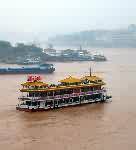

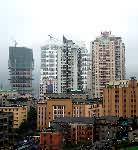
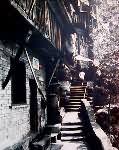
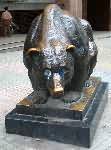
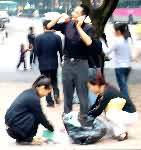
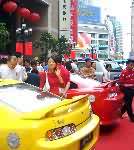
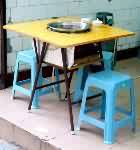
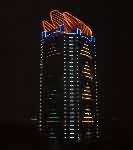
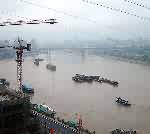
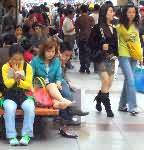
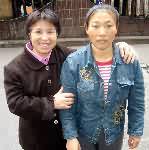


 Copyright © 1998-2026 All rights reserved.
Copyright © 1998-2026 All rights reserved.